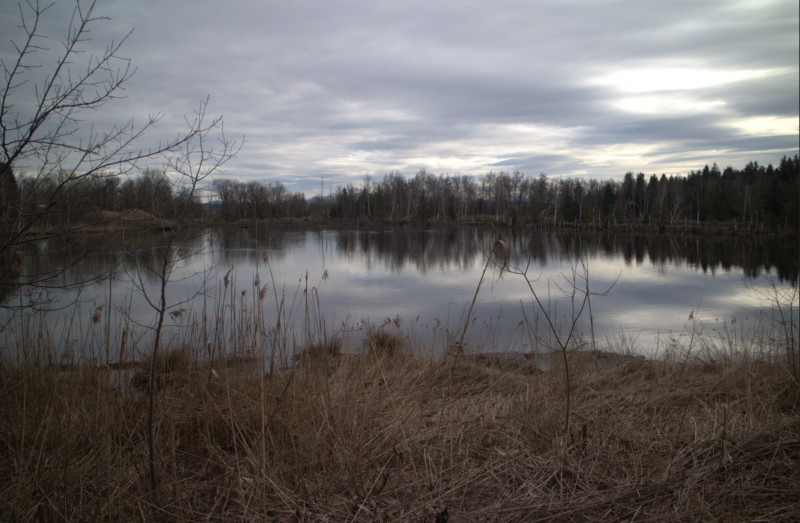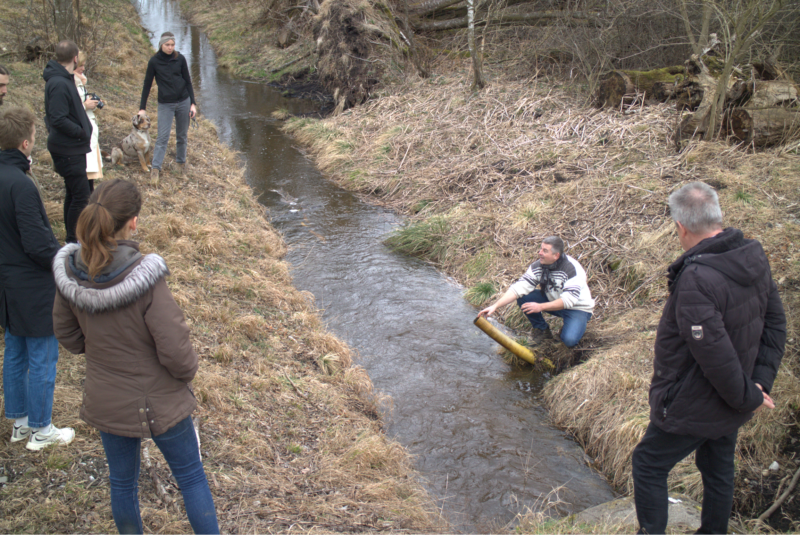
©Twelbeck IDK
Commitment to Climate Protection: Political Demands, Local Initiatives

©Twelbeck IDK
The IDK Field Workshops seek to explore how global environmental challenges translate on the local and regional level, and what communities can do, and do, to meet those challenges. While our first Field Workshop turned to problems of water balance and management in Augsburg and surrounding areas, our second field workshop was dedicated to climate protection as a political issue and practical challenge in two selected areas in Bavaria: Augsburg and Weilheim.
The workshop kicked off with a conversation with Sophie Zibell, climate activist and founding member of the Augsburg Climate Camp (since 2020). Located next to Augsburg City Hall, the Climate Camp is a highly visible and (perhaps surprisingly) persistent reminder of the city’s promise to fulfill the 2015 Paris Climate objectives and emphasizes the rights of poor and vulnerable groups that must be taken into account in the process. During the very lively conversation, Sophie Zibell explained about the utopian character of the camp and the politically heterogenous mix of people engaged, its engagement with local initiatives to further public transport and forest preservation, and the struggles with established political structures in the city of Augsburg. When asked when the initiative would “break tent” Zibell responded, flatly: “we will leave when the city does things out or their own initiative.”

©Twelbeck IDK
The conversation was complemented by a talk by the Historian Prof. Dr. Stefan Lindl on “Urban Transformations: City Planning in Times of Climate Change.” Lindl brought together the concept of the “ville” (material infrastructure” and the idea of “cite” (immaterial infrastructure) to then focus on Augsburg’s old town as an exemplary case. An animated model of Max Street allowed the audience to better grasp Lindl’s concept that relies on tree planting on places that used to be overbuilt by buildings hundreds of years ago. Highly aware of historical structures and traditions, such a concept, he argues, can contribute to urban health while increasing the population’s identification with the city and its history. This concept, he emphasized, will neither do away with “toxic narratives” like the city’s history during National Socialism nor will it turn Augsburg into a climate-friendly “Disneyland.” As became clear during the very engaged and multifaceted discussion, the project is not simply an academic vision but a very concrete measure that has already made its way into the public debate.

The next day started with a visit to the peatlands near Weilheim in Upper Bavaria. The group was accompanied by meteorologist and climate scientist Professor Dr. Stefan Emeis, who lives in Weilheim, holds various political functions there, and engages in several initiatives that support the city’s goal to become climate-neutral by 2035.
Peatlands can capture more carbon dioxide from the atmosphere than any other ecosystem, but they can also set it free in climate-damaging quantities. To support the former and avoid the latter, the German government has decided to rewet and restore a considerable number of German peatlands to fulfill EU regulations and international commitments. This is what’s happening near Weilheim, where the Greensurance Foundation finances and manages a renaturation project. Together with Greensurance founder Marcus Reichenberg and co-worker Maria Umlauf, the group explored various sites in the restoration landscape, gathered information about the processes involved in peatland rewetting and preservation, and was able to experience the soil vibrations that emerge when a larger group jumps on peat soil.

©Twelbeck IDK
Peatland preservation is not the only measure that the city of Weilheim drives forward in its effort to mitigate climate change and preserve biodiversity. The cooperation with the “Energiewende Oberland” foundation, the hiring of a climate manager, the installation of PV systems, and the support of local networks and supply chains are also important elements to reach the city’s self-proclaimed goal to become climate-neutral by 2035. We had the opportunity to meet with climate manager Angelika Baur, the city’s building councilor Katrin Fischer, Prof. Dr. Reinhold Schumacher and Michael Rottman from the natural preservation initiative “Schutzgemeinschaft Weilheimer Moos,” and ecological farmer Monika Winterholler, to discuss the opportunities and challenges to the city’s initiative from various perspectives. Taking place during a time of discontent and protest by German farmers who, among other grievances, complain about the consequences of climate and biodiversity measures on their work and agricultural practices, the conversation helped understand potential conflict zones including fears concerning irrigation in connection with PV systems. But it also highlighted a shared interest in preserving and furthering biodiversity and reducing carbon dioxide and a shared frustration concerning bureaucratic processes, staff shortages, and quickly changing regulations and policies that create insecurity and prevent concrete and necessary action. Our group left the conversation deeply impressed about the optimism, stamina, and open debate culture that seems to persist in Weilheim, and by what the city and its inhabitants have achieved already. Thank you for a wonderful day!
– by Kirsten Twelbeck
